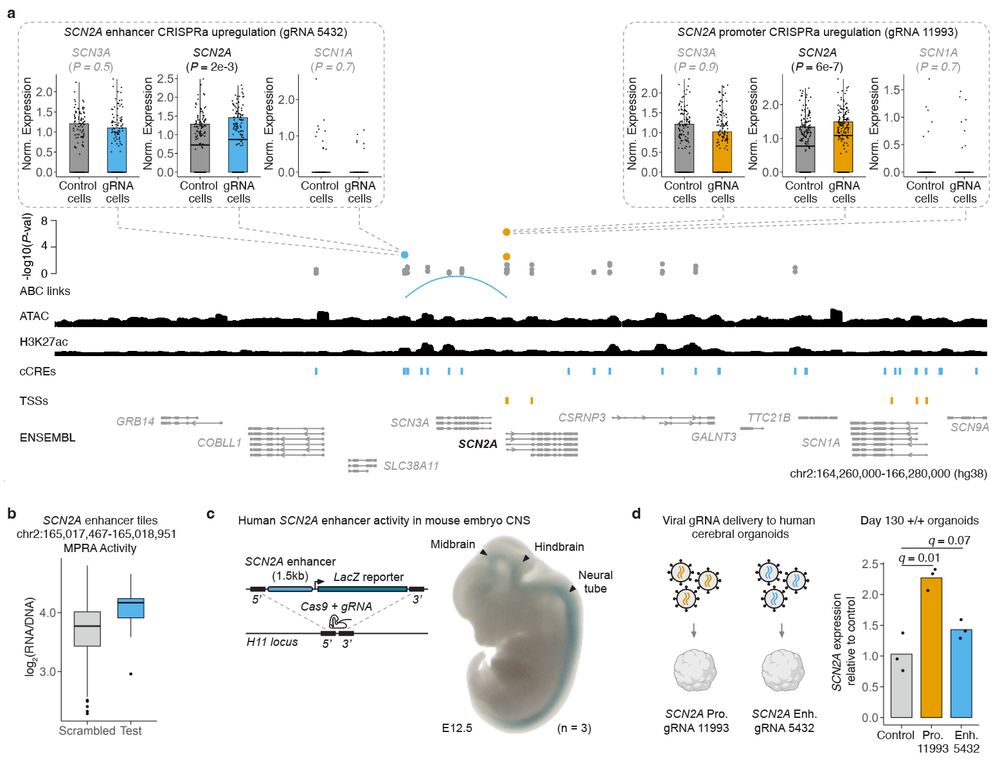
Troy McDiarmid
@troymcdiarmid.bsky.social
Banting Postdoc with @JShendure @uwgenome | Prev
@CIHR_IRSC UBC Neuro PhD | Genome engineering, molecular recording, neurodevelopment and its disorders | Mountains & skateboarding
@CIHR_IRSC UBC Neuro PhD | Genome engineering, molecular recording, neurodevelopment and its disorders | Mountains & skateboarding
Finally, we confirmed that several of the CRISPRa gRNAs identified here demonstrated selective and therapeutically relevant upregulation of SCN2A, CHD8, CTNND2 and TCF4 when delivered virally to patient cell lines, human cerebral organoids, and a humanized mouse model of hTcf4.


November 5, 2025 at 3:21 PM
Finally, we confirmed that several of the CRISPRa gRNAs identified here demonstrated selective and therapeutically relevant upregulation of SCN2A, CHD8, CTNND2 and TCF4 when delivered virally to patient cell lines, human cerebral organoids, and a humanized mouse model of hTcf4.
We identified hundreds of promoter- and enhancer-targeting CRISPRa gRNAs that upregulated 200 of the 337 NDD genes in human neurons, including 91 novel enhancer-gene pairs.

November 5, 2025 at 3:19 PM
We identified hundreds of promoter- and enhancer-targeting CRISPRa gRNAs that upregulated 200 of the 337 NDD genes in human neurons, including 91 novel enhancer-gene pairs.
Next, we applied multiplex single-cell CRISPRa screening with 15,643 gRNAs to test all MPRA-prioritized cCREs and 761 promoters of NDD genes in their endogenous genomic contexts.

November 5, 2025 at 3:19 PM
Next, we applied multiplex single-cell CRISPRa screening with 15,643 gRNAs to test all MPRA-prioritized cCREs and 761 promoters of NDD genes in their endogenous genomic contexts.
We then tested all 5,425 candidate neuronal enhancers with MPRA, identifying 2,422 that are active in human neurons.

November 5, 2025 at 3:18 PM
We then tested all 5,425 candidate neuronal enhancers with MPRA, identifying 2,422 that are active in human neurons.
We first prioritized 337 haploinsufficient NDD risk genes from 42,320 cases. We then nominated 5,425 candidate enhancers for these 337 genes leveraging multiple datasets characterizing the regulatory landscape of the developing human brain, together with various enhancer-gene mapping strategies.

November 5, 2025 at 3:17 PM
We first prioritized 337 haploinsufficient NDD risk genes from 42,320 cases. We then nominated 5,425 candidate enhancers for these 337 genes leveraging multiple datasets characterizing the regulatory landscape of the developing human brain, together with various enhancer-gene mapping strategies.
Here, we combined Massively Parallel Reporter Assays (MPRAs) and a multiplex single cell CRISPRa screen to discover functional human neural enhancers whose CRISPRa targeting yields specific upregulation of NDD risk genes.

November 5, 2025 at 3:16 PM
Here, we combined Massively Parallel Reporter Assays (MPRAs) and a multiplex single cell CRISPRa screen to discover functional human neural enhancers whose CRISPRa targeting yields specific upregulation of NDD risk genes.
However, scaling this cis-regulatory therapy (CRT) paradigm requires pinpointing which candidate cis-regulatory elements (i.e. promoters and enhancers) are active in human neurons, and which can be targeted with CRISPRa to yield specific and therapeutic levels of target gene upregulation.

November 5, 2025 at 3:14 PM
However, scaling this cis-regulatory therapy (CRT) paradigm requires pinpointing which candidate cis-regulatory elements (i.e. promoters and enhancers) are active in human neurons, and which can be targeted with CRISPRa to yield specific and therapeutic levels of target gene upregulation.
Many neurodevelopmental disorders are caused by haploinsufficiency - where functional loss of one gene copy leaves insufficient expression from the other.
CRISPR-based gene activation (CRISPRa) has emerged as a promising therapeutic approach for NDD caused by haploinsufficiency.
CRISPR-based gene activation (CRISPRa) has emerged as a promising therapeutic approach for NDD caused by haploinsufficiency.

November 5, 2025 at 3:13 PM
Many neurodevelopmental disorders are caused by haploinsufficiency - where functional loss of one gene copy leaves insufficient expression from the other.
CRISPR-based gene activation (CRISPRa) has emerged as a promising therapeutic approach for NDD caused by haploinsufficiency.
CRISPR-based gene activation (CRISPRa) has emerged as a promising therapeutic approach for NDD caused by haploinsufficiency.
Stoked to share our latest work entitled: “Large-scale discovery of neural enhancers for cis-regulation therapies”
shorturl.at/H3Qww
This is an enormous team effort that I had the honour of spearheading with Nick Page and Florence Chardon.
Bluetorial below.
shorturl.at/H3Qww
This is an enormous team effort that I had the honour of spearheading with Nick Page and Florence Chardon.
Bluetorial below.
November 5, 2025 at 3:09 PM
Stoked to share our latest work entitled: “Large-scale discovery of neural enhancers for cis-regulation therapies”
shorturl.at/H3Qww
This is an enormous team effort that I had the honour of spearheading with Nick Page and Florence Chardon.
Bluetorial below.
shorturl.at/H3Qww
This is an enormous team effort that I had the honour of spearheading with Nick Page and Florence Chardon.
Bluetorial below.

